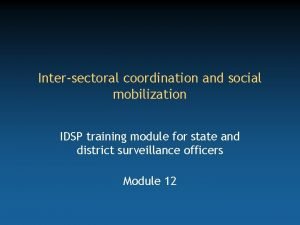ILOJapan Regional Workshop Sectoral Approach to Skills for











- Slides: 11

ILO/Japan Regional Workshop Sectoral Approach to Skills for Green Jobs 24 -25 January 2017, Bangkok, Thailand Sectoral Approach to Skills Development Akiko Sakamoto ILO -Bangkok

Why now sectoral approach? Ø A relatively new approach to many developing countries in Asia, why? ü Skills and training have traditionally been seen as the work of government and has been centrally planned ü Business and competitive strategy based on low price, labour-intensive approach required fewer high skills – skills were not part of competitive strategy Ø Sectoral approach is highlighted as one of 10 key building blocks of the G 20 Training Strategy (2011)

What is a sectoral approach to skills development? Ø Promotes skills development from the point of view of a specific industrial and occupational sector ü Articulating skills and training needs ü Providing inputs to relevant competency standards, or training curriculum ü Organizing, delivering and participating in training programs, according to their priorities; assessing training outcomes Ø Responds to sector specific challenges with sector specific skills solutions; drawing on sector knowledge and resources Ø Positions skills as a key strategy for moving up and taking the sector to a next level

Why is a sectoral approach to skills development being promoted? ü Limitation of centralized approaches to skills development ü Increase in skills mismatch – unable to fill vacancies while workers struggle to find jobs ü Practical means for linking training and work –increasing impact of skills on employment and productivity ü A means of greater industry engagement in skills development ü Relevant approach as the sector attempts to move up the value chain and compete on quality market

Skills as a key strategy for sector development Regulations Employers Business Strategy Skills Acquisition Skills Utilization The productive System Skills Supply Bodies Skills Supply Professional Bodies Institutional Support Worker Reps/Unions Policy Makers Incentives The Sectoral Stakeholder Platform Public Policy Source: Sung and Ashton, 2014, p 173

What does a sectoral approach deliver? Ø International experience shows that sectoral approaches can provide: – Analysis of business environment affecting quantitative or qualitative skills needs – Forecasting skills needs – Matching training provision to meet specific skills needs – Facilitating skills utilization and enabling productive transformation (i. e. moving up value-chains); – Preparation of occupational or qualification standards – Policy advice on lifelong learning or VET – Fostering cooperation between educational providers and employers – Provision of training for the work force – Funding of training.

Variations in sectoral approaches Ø Sectoral approaches to skills development can take different forms and the roles and structures vary considerably § Roles and functions § Broad or narrow coverage § Ranging from advisory, skills needs assessment, standards development and training delivery to certification, job placement, and coordination § Proactive bodies promoting strategic sector development plans § Institutional arrangements § Many countries opt to establish a formal structure such as sector skill councils (industry skills councils), although there are only a few in the region § Members § Funding

How are sectoral approaches evolving? • Increase in formalized, independent, sector-specific bodies (e. g. industry skills councils, sector skills councils, industry training bodies) • Permanent and independent bodies have a well-established role in some countries (UK, Australia, Canada, New Zealand, Netherlands, Brazil and South Africa) • 22 of 28 EU countries have adopted a sectoral approach • Similar arrangements in Bangladesh, Malaysia, India and Singapore

Challenges and Enabling factors • Establishing formal structures is not a goal in itself • The experience in Bangladesh and India suggests considerable success in increasing industry engagement in skills, but face a number of challenge including sustainability • Formalized approach seems to work when there is: q Immediate skills needs that require the sector’s collective response q Policy level support for sector-based skills actions q Adequate funding (but with a future financial plan) q Technical support (especially for the start-up phase) q Leadership and strong sustained commitment q Time

Implications for skills and green jobs • Sector skills approach responds to: • How a sector sees the challenges, priorities and solutions of promoting environmental sustainability • Likely impact on jobs (quantitative and qualitative) • And collectively acting in identifying, articulating and responding to new and different skills requirements: o Skills needs assessment o Development of competency standards and training o Training of trainers o Training delivery and assessment o Coordination with training agency and institutions o Negotiation and promotion of sector green strategy

Thank you For further information please contact: Akiko Sakamoto Senior Specialist on Skills & Employability ILO Decent Work Team Bangkok Tel No. +66 2 2881725 E mail address: sakamoto@ilo. org
 Blueprint for sectoral cooperation on skills
Blueprint for sectoral cooperation on skills Sectoral training
Sectoral training Intra sectoral coordination
Intra sectoral coordination Midlands regional skills forum
Midlands regional skills forum Gdc arki
Gdc arki Ally skills workshop
Ally skills workshop Kontinuitetshantering i praktiken
Kontinuitetshantering i praktiken Typiska drag för en novell
Typiska drag för en novell Tack för att ni lyssnade bild
Tack för att ni lyssnade bild Vad står k.r.å.k.a.n för
Vad står k.r.å.k.a.n för Shingelfrisyren
Shingelfrisyren En lathund för arbete med kontinuitetshantering
En lathund för arbete med kontinuitetshantering




















